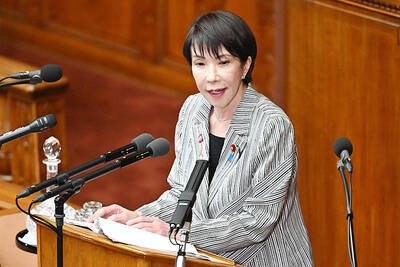Only two of China’s 31 incentives for Taiwanese are new, national security officials said yesterday.
Beijing on Feb. 28 announced the incentives targeting Taiwanese businesses, civic groups, cultural workers and artists, but only two are new measures and the rest were either measures announced previously or extensions of existing measures, a security official said on condition of anonymity.
Beijing is bringing its “united front” tactics to the table to develop intermediaries who could speak for China, the source said.
As the incentives include funding for exchanges between Taiwanese and Chinese non-governmental organizations, it suggest that Beijing is trying to lure Taiwanese with financial benefits, the source said.
In addition to revising the National Security Act (國家安全法), national security authorities have responded to China’s stepped-up activity by establishing a surveillance program to monitor the connections and finances of a number of groups and individuals close to Beijing, the source said.
An investigation in December last year into the alleged involvement of New Party spokesman Wang Ping-chung (王炳忠) in an espionage case connected to convicted Chinese spy Zhou Hongxu (周泓旭) found that Wang had received US$200,000 from China’s Taiwan Affairs Office.
Since the inauguration of President Tsai Ing-wen’s (蔡英文) Democratic Progressive Party administration in May 2016, China has provided funding or sponsored activities for specific groups in Taiwan, such as Aborigines, rural communities, religious groups and criminal organizations in a bid to develop local networks or instigate protests to influence elections and compromise Taiwan’s national security, the source said.
By nosing its way into Taiwanese non-governmental groups, Beijing is developing proxies in Taiwan to execute its policies, the source added.
One of the two incentives that are new allows for cooperation on sharing credit information between banking sectors.
Taiwanese and Chinese bankers have proposed establishing a credit-information sharing mechanism, but the Financial Supervisory Commission has rejected it due to concerns over Beijing using personal information for political and surveillance purposes.
China’s announcement last year that it would develop industrial parks in central, western and northeastern China targeting cross-strait cooperation to encourage Taiwanese businesses to move to those areas and participate in its Belt and Road Initiative was seen as a bid to counter Tsai’s New Southbound Policy by encouraging underperforming Taiwanese businesses to connect with Southeast Asian nations under the Belt and Road framework, the source said.
Taiwanese businesses would be able to pay lower social insurance premiums under Beijing’s incentive program, they said, adding that the effectiveness of the policy remains to be seen.
While Beijing has announced that 12 incentives were being offered exclusively to Taiwanese businesses, the ability to participate in the “Made in China 2025” program, infrastructure construction and government procurement was extended to all foreign businesses last year, the source said.
According to a Chinese tax law implemented in 2008, a 15 percent tax benefit is extended to Chinese and international firms with advanced and innovative technology, and not exclusively to Taiwanese companies, the source added.

The Central Weather Administration (CWA) yesterday said it expected to issue a sea warning for Typhoon Fung-Wong tomorrow, which it said would possibly make landfall near central Taiwan. As of 2am yesterday, Fung-Wong was about 1,760km southeast of Oluanpi (鵝鑾鼻), Taiwan’s southernmost point, moving west-northwest at 26kph. It is forecast to reach Luzon in the northern Philippines by tomorrow, the CWA said. After entering the South China Sea, Typhoon Fung-Wong is likely to turn northward toward Taiwan, CWA forecaster Chang Chun-yao (張峻堯) said, adding that it would likely make landfall near central Taiwan. The CWA expects to issue a land

Taiwan’s exports soared to an all-time high of US$61.8 billion last month, surging 49.7 percent from a year earlier, as the global frenzy for artificial intelligence (AI) applications and new consumer electronics powered shipments of high-tech goods, the Ministry of Finance said yesterday. It was the first time exports had exceeded the US$60 billion mark, fueled by the global boom in AI development that has significantly boosted Taiwanese companies across the international supply chain, Department of Statistics Director-General Beatrice Tsai (蔡美娜) told a media briefing. “There is a consensus among major AI players that the upcycle is still in its early stage,”

The Central Weather Administration (CWA) yesterday said it is expected to issue a sea warning for Typhoon Fung-wong this afternoon and a land warning tomorrow. As of 1pm, the storm was about 1,070km southeast of Oluanpi (鵝鑾鼻), Taiwan’s southernmost point, and was moving west-northwest at 28 to 32kph, according to CWA data. The storm had a radius of 250km, with maximum sustained winds of 173kph and gusts reaching 209kph, the CWA added. The storm is forecast to pass near Luzon in the Philippines before entering the South China Sea and potentially turning northward toward Taiwan, the CWA said. CWA forecaster Chang Chun-yao (張峻堯) said

Japanese Prime Minister Sanae Takaichi yesterday said that China using armed force against Taiwan could constitute a "survival-threatening situation" for Japan, allowing the country to mobilize the Japanese armed forces under its security laws. Takaichi made the remarks during a parliamentary session while responding to a question about whether a "Taiwan contingency" involving a Chinese naval blockade would qualify as a "survival-threatening situation" for Japan, according to a report by Japan’s Asahi Shimbun. "If warships are used and other armed actions are involved, I believe this could constitute a survival-threatening situation," Takaichi was quoted as saying in the report. Under Japan’s security legislation,